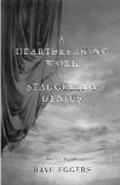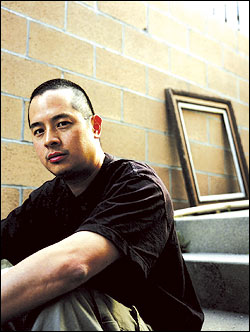IT’S HARD TO FIND NEW ways to cleverly bare your soul in public, but Dave Eggers has done it by simply outdoing everybody else in the cleverness competition. His shrewdness manifests itself all over his new memoir, starting with the title. A Heartbreaking Work of Staggering Genius can be considered fair warning to the reader: Not so much a statement of what’s in store as a hint of what you’re up against, the title is so loaded with sarcasm, sincerity, self-loathing, and wishful thinking that it’s likely Eggers himself hasn’t quite figured out how much he does or doesn’t mean it. And that’s the way he wants it. Probably.
A Heartbreaking Work of Staggering Genius by Dave Eggers (Simon & Schuster, $23)
So getting beyond the fa硤e of Genius (a truncation Eggers would doubtless approve of, if only as a joke, which deep down he really means—or not) can be tough. Eggers’ ur-cleverness makes it hard not to wonder how much you’d miss out on if you were to take one glance at the book’s self-incriminating self-mockery and instinctively flee. But that’s assuming Genius is merely the sum of its conceits and little more. Of course, that might be plenty to go on: I’m a fan of both Might, the San Francisco- based satirical magazine Eggers founded in the early ’90s, whose conception is detailed in the book, and of McSweeney’s, the literary journal Eggers currently edits.
But compulsive self-consciousness—”self-devouring” is Eggers’ own term for it—is a comedic cul-de-sac, as anyone who read Spy, a magazine Might bettered in every conceivable way, knows. So while Genius might not be quite what its title promises, it is deeply affecting and unmawkish and singular and brilliant. Not only are the relatively dry spots pretty entertaining and the emotionally trickier parts handled with extraordinary grace, by the time the book ends, Clever Dave has revealed Real Dave—or at least as much of him as the book’s reflexive irony allows.
GENIUS TELLS THE STORY of how Eggers, at 21, wound up caring for his 8-year-old brother, Christopher, after their parents died five weeks apart of unrelated cancers. The brothers follow their older sister Beth, a law student, to Berkeley, California, where Dave begins publishing the satirical magazine Might and applies singular methods of raising his brother: making tacos with spaghetti sauce, sliding across smooth floors in their socks, and reading bedtime stories like John Hersey’s Hiroshima.
He also wrestles with his conscience over telling his story in book form; over leaving Toph with a babysitter while he has a good time with his friends; over using former Eight Is Enough star Adam Rich, whose death Might fictionalized for a cover story, as a stand-in for his own desire for fame; and, perhaps most entertainingly, over auditioning for MTV’s The Real World.
“Everyone’s seen the show,” he writes. “We all despise it, are enthralled by it, morbidly curious. . . . Are our lives like that? Do we talk like that, look like that? Yes. It could not be. It is.”
Often, these digressions are disguised as conversations with other characters in the book, a device that pinpoints Eggers’ deftness as a writer: Instead of being one-dimensional, they build from mundane, two-syllable exchanges into withering jabs at his own self-obsession—something anyone who’s spent a fair amount of time staring into their own navel should have little trouble recognizing.
Still, that self-obsession is Eggers’ most visible flaw as a writer. Genius may be a satirical memoir, may be a goof on his own cleverness as well as an affirmation of it, but that doesn’t explain how Toph, after nearly 400 pages pivot around his presence, still registers more as a plot point than a character. We never get any sense of what might have been going through this kid’s head as he found himself being taken care of by his older sibling. Genius calls attention to and mocks its own grandiose intentions, and often transcends them altogether. But as a celebration of Eggers’ self-referentiality, the book is still trapped by it.








